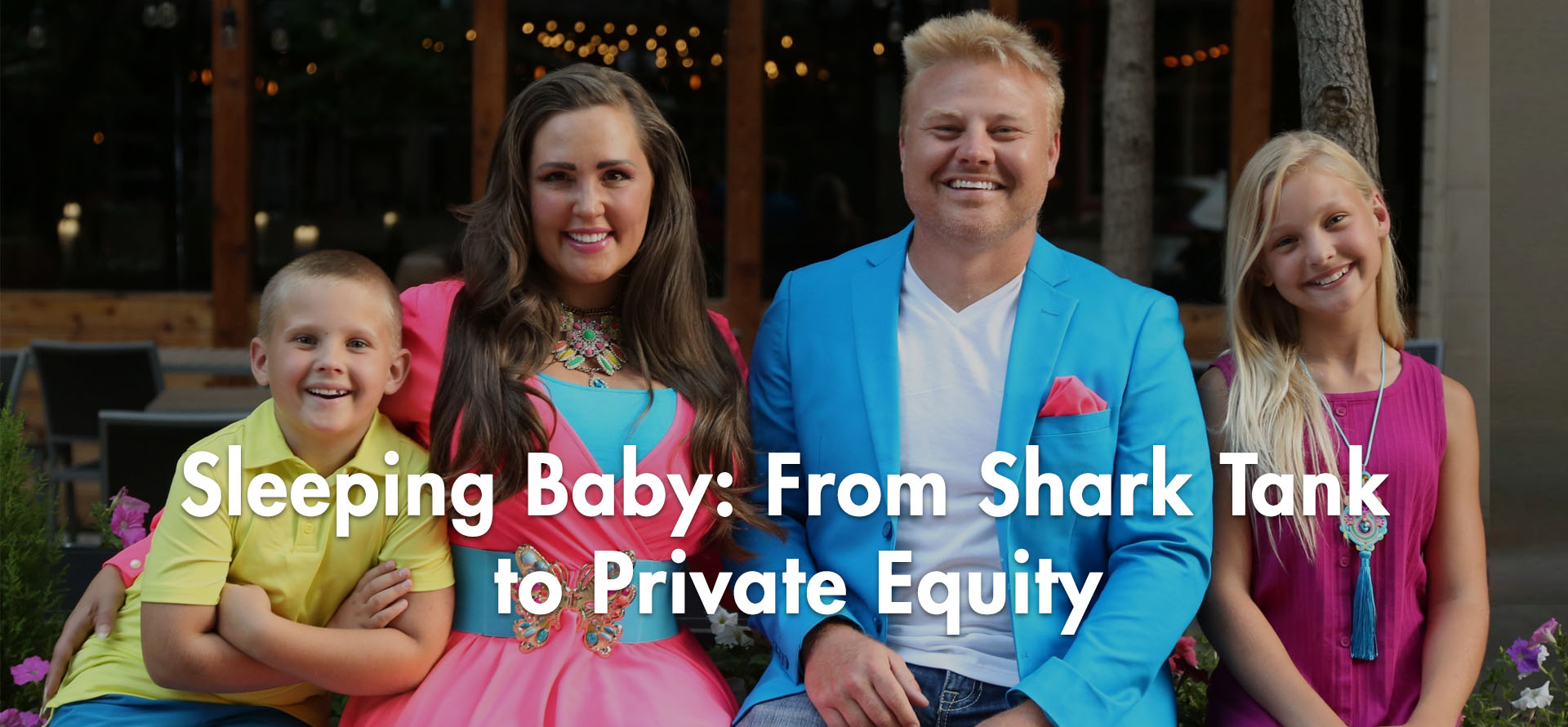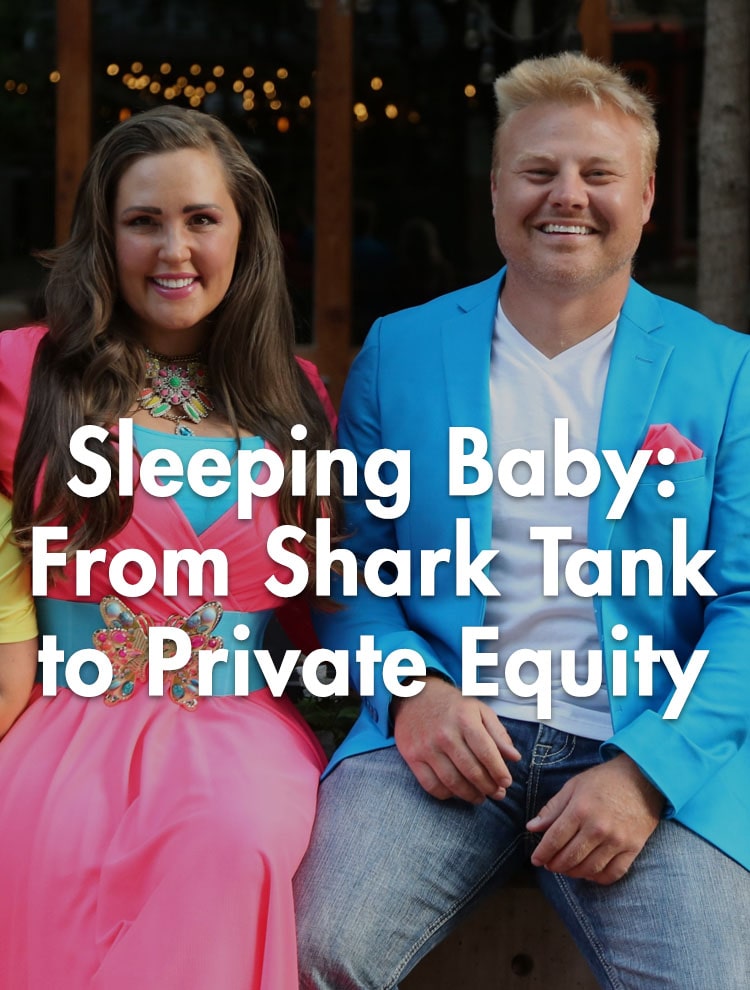As the saying goes, necessity is the mother of invention. For Brett and Stephanie Parker, the necessity was sleep, the invention was an infant sleep aid and the inventor was an actual mother.
It began a few months after their newborn daughter, Charlotte, began rolling over in her sleep and breaking out of her swaddle. She went from logging ten-plus hours to waking up wailing due to her restless night.
What Brett and Stephanie didn’t know was that Charlotte was experiencing the Moro reflex, a startle response triggered by a loud noise or, as in Charlotte’s case, the sensation of falling, brought about by the unfurling of her swaddle. The recommended fix (swaddling) was no longer an option.
Luckily, Stephanie found a solution. Grabbing an old sweater and her eighth grade sewing machine, she created a makeshift sleep sack that would come to be known as a Zipadee-Zip. The result was crude — a Frankensteined garment with a zip up the front and the arms and bottom cut off and sewn shut. It resembled something like a starfish. But, says Stephanie, “Charlotte slept longer than twelve hours that night.”
“They were ugly.”
She knew she had to share the discovery with her friends who were experiencing the same growing pains with their infants. A spin through Walmart gave her the materials she needed — a few zip-ups and some baby pajamas that she could cut up for the prints. “They were ugly,” Stephanie says simply of her early creations. In fact, in the beginning, she had a fair share of naysayers. “But babies were sleeping, and moms and dads were talking.”
Things progressed quickly from there. With no marketing, other than posts on her personal Facebook page and word of mouth, the buzz around Sleeping Baby only grew louder. As a result, Stephanie became a one-woman manufacturing and shipping center, often staying up until the wee hours of the morning to fulfill requests. “Brett looked at me and was like, ‘You are going to burn out before you even get started,’” she remembers.
So, Brett took action and left his corporate job to help Stephanie. He secured their first shipping center (really a coffee shop that also offered a postal service) and eventually found a manufacturer and a fulfillment company. Sleeping Baby was officially launched.
Before long, they found a way to take their business to the next level: Shark Tank. It was the second time they applied to the ABC reality series, in which entrepreneurs present their businesses to potential investors. Their first brush with the Tank happened about two years prior when Stephanie flew to Chicago to an open call and landed a spot on the show. Ultimately, they passed on that first opportunity, but, says Stephanie, “Sometimes no is the best yes, because when we said no to that, we were able to then say yes to really beefing up our customer service, our website and finding a manufacturer.”
“Sometimes no is the best yes.”
Their pitch piqued the interest of three investors, and during filming, they decided to accept the two-hundred thousand dollar offer with a twenty percent stake from Daymond John. In the end, they did not go through with the deal, but they felt the aftereffects of their appearance anyway.
Prior to the episode airing, they stockpiled enough Zipadee-Zips to last for six to nine months of sales. “It was like preparing for the apocalypse,” Stephanie quips. But their stock only lasted two weeks. Customers ended up turning to eBay where they bought used Zipadee-Zips for more than a hundred dollars.
Protecting their ideas with patents became a crucial next step. After a few years of pursuing patents to no avail, Brett was recommended the law firm Fogel & Potamianos LLP (F&P), led by the firm’s partners Jerome Fogel and Constantine S. Potamianos. Thus began a long-term partnership that started with F&P’s handling of a dispute and evolved into the firm acting as Sleeping Baby’s general counsel.
F&P managed to obtain several elusive patents and trademarks on the Zipadee-Zip and other Sleeping Baby merchandise. As new products were added to the company roster, they helped Brett and Stephanie develop protectable IP around those items, too. Instrumental to that process was F&P’s Robert Kramer, who used his twenty years of experience in intellectual property law — and background as a mechanical engineer and inventor — to secure the patents.
As Sleeping Baby expanded globally, F&P worked on their distribution arrangements in Japan and the UK, creating wholesale agreements which allowed Brett and Stephanie to continue to expand their business.
Armed with a roster of popular products and the patents to back them up, Sleeping Baby was an undeniable triumph — but there came a point when Brett and Stephanie felt it was time to move on. The success of their company had led them to start two others: Leap of Faith, specializing in order fulfillment; and Effortless Branding, which handles embroidery and screen-printing.
F&P went into overdrive. They prepared Brett and Stephanie’s intellectual property portfolios, worked on their corporate governance and connected them with potential advisors they would need for the sale. Once a buyer was lined up, F&P began working through the purchase agreements and due diligence. “It’s an emotional roller-coaster,” says Brett of selling a business. “You’re trying to get as much as you can, whoever’s buying you is trying to buy you as cheap as they can and somewhere in the middle is reality. And you need to put people in your corner who are going to help you through that process — so you don’t make an emotional decision.”
“You don’t know how good your lawyer is, how good your insurance is, or how good your business broker is until you have to use them. And I accidentally built a home run team.”
What Brett found in Jerome was someone who was honest about expectations — “there wasn’t a false sense of hope,” Brett says. Jerome made transparency a priority — by outlining the risks, staying calm, taking the time to interpret and explain the legal jargon and making himself available for Brett and Stephanie’s questions.
What all three members of F&P brought to the table was a holistic approach to their dealings. Jerome, Constantine and Robert had all worked at large firms and had careers in other fields, including starting and running their own businesses. Constantine’s experience in corporate governance was especially helpful when it came time to place Brett and Stephanie’s individual deal in the context of the marketplace.
F&P was also unafraid to be assertive on behalf of Sleeping Baby, proceeding throughout the deal with confidence in their pursuit to get Brett and Stephanie the best possible result. They managed to do so without alienating the other participants in the sale, even creating a new connection with Jason Somerville — the co-founder and managing partner of Global Wired Advisors — who brokered the deal. “You don’t know how good your lawyer is, how good your insurance is, or how good your business broker is until you have to use them. And I accidentally built a home run team,” Brett says.
F&P worked for a solid ninety days to negotiate the terms of the agreement, finally closing on December 30, 2021. “I think when you strive towards a goal, build a team and accomplish that goal, it does something for your morale,” Brett says. “[Their] paycheck didn’t say Sleeping Baby, but we were a team and we operated that way.”
The business was, says Brett, his wife’s baby — pun intended. Their years-long journey culminated in not one, but two new businesses, not to mention the thousands of well-rested babies and parents as a result of their creation. “You’re in a position to sell your business because you’ve made a ton of sound decisions. You don’t want the last decision you make for your business to be an emotional one,” Brett says. “You can only sell once.”
The business was, says Brett, his wife’s baby Though, he points out, “We didn’t start this to create a business — we started this so I could go back to sleep.”
“I think when you strive towards a goal, build a team and accomplish that goal, it does something for your morale.”




